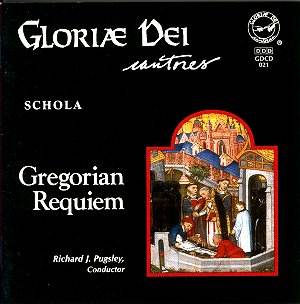The plainchant requiem has threaded its way through
our musical culture since the medieval period. Masses have been
based on theses lovely chants and many composers have written
their own settings for parts of the service. But complete sung
requiem requires a considerable amount of chant and in some cases
a number of alternatives may be sung.
On this disc, Gloriae Dei Cantores perform a
complete survey of the plainchant for the requiem mass. They start
with two psalms and antiphons for the vigil, going on to the six
antiphons sung in church before the mass. These are followed by
a complete mass, with Ordinary and Propers, plus the Dies Irae.
This latter is not currently in the Requiem Mass but it has been
an important part of this mass since 13th Century.
This complete mass is followed by another set of Propers, giving
some of the many alternatives that are available. The disk is
completed by two Antiphons and the Canticle and Antiphon that
are sung as the body is being taken from the church, though in
the medieval period these were sung at the graveside.
This recording is not an historical reconstruction.
The group sings Mass and the Benedictine Monastic Offices regularly
at the Church of the Transfiguration, Orleans, Massachusetts,
so the style of singing and the selection of chant is firmly based
on current usage. The Gloriae Dei Cantores Schola numbers about
16 people, here directed by Dr. Richard Pugsley. They are a mixed
group and generally the sexes take it in turns to sing complete
chants, but the whole group chants the psalms.
The group is a non-professional one, which has
advantages and disadvantages. From their daily singing of the
Offices, the group have developed a familiarity and flexibility
which is admirable and must certainly be impressive and moving
when heard live, during services. But on a recording, even one
as sympathetically recorded as this one, small slips can give
them away. This is notable in the occasional lack of a clean attack
or the lack of unanimity of line. These are small, but significant
faults. They are balanced by the group's undoubted virtues and
their wonderful commitment to text and music. But some listeners
may find that, on repeated listening, these blemishes may become
irksome.
The role of cantor is shared among a number of
singers and again this reaps mixed rewards as not all the singers
are of true solo stature, but all of them are committed and sympathetic
to the group's musical ethos.
The chant is sung at a very steady pace. This
works, pretty well, in the more elaborate passages. But the psalms,
sung at this speed with significant pauses in the texture, easily
start to sound a little bogged down. Even in the more developed
chant I would have liked a greater sense of flow (and speed).
This performance might work well in a building with a resonant
acoustic. But this recording is sympathetically close and we could
have done with a greater feeling of movement. I would have especially
liked this in the Dies Irae, which starts to rather outstay its
welcome. It is not performed alternim, but sung through by the
men at a very steady pace pitched rather too low for the comfort
of the group. This movement, in particular, does feel like a missed
opportunity.
Naxos have also issued a plainchant requiem,
sung by the female group Aurora Surgit. The layout of the Naxos
disc differs somewhat from the Gloriae Dei Cantores and this may
affect your choice (though at super budget price, the enthusiast
could afford both). Aurora Surgit do not prefix the mass with
all the psalms and antiphons that Gloriae Dei Cantores do. Aurora
Surgit sing only one set of propers as theirs is a complete mass
reconstruction, with Epistle, Gospel, Preface and Eucharistic
Prayer. The result is to lay more emphasis on the service itself.
Whereas Gloriae Dei Cantores, by including far more chant than
would be included in the average service, place more emphasis
on the chant for its own sake.
This recording will be a must for anyone who
has opened their Liber to sing part of the Requiem Mass and wondered
what all the other music would sound like. Here, rather enterprisingly,
Gloriae Dei Cantores give us the ability to find out.
Robert Hugill
A remarkably comprehensive disc of chants from
the Officium Defunctorum, including not just the mass but the
psalms and antiphons from before and after the mass … see Full
Review


![]() Gloriae Dei Cantores
Schola/Dr. Richard J. Pugsley (director)
Gloriae Dei Cantores
Schola/Dr. Richard J. Pugsley (director) ![]() GLORIAE DEI CANTORES
GDCD021 [77.49]
GLORIAE DEI CANTORES
GDCD021 [77.49]